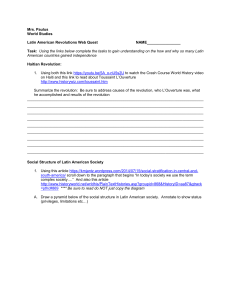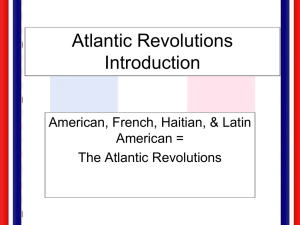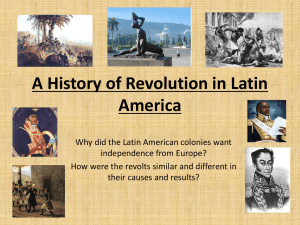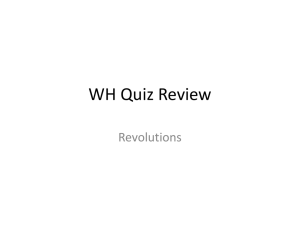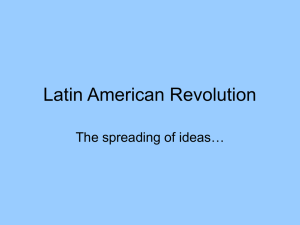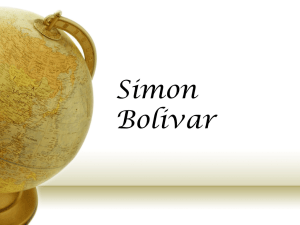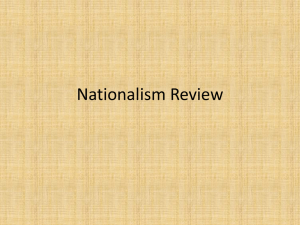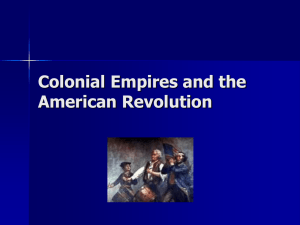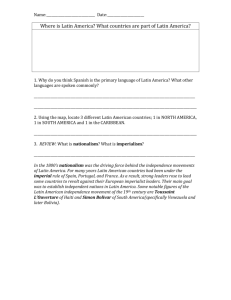1 - Davis School District
advertisement
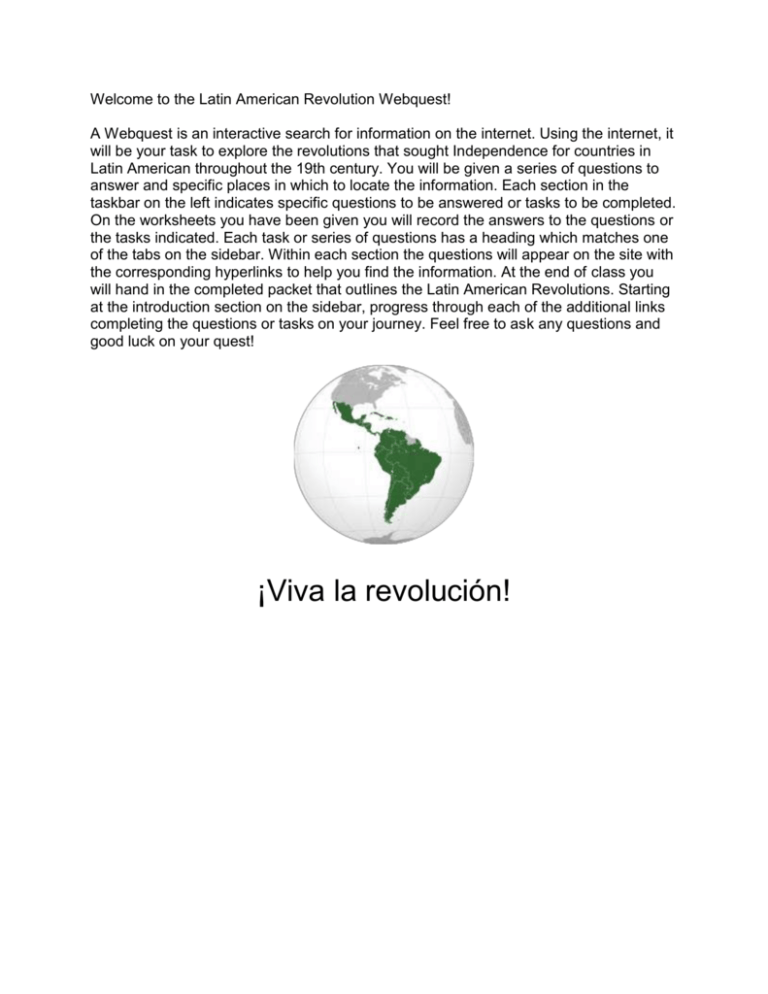
Welcome to the Latin American Revolution Webquest! A Webquest is an interactive search for information on the internet. Using the internet, it will be your task to explore the revolutions that sought Independence for countries in Latin American throughout the 19th century. You will be given a series of questions to answer and specific places in which to locate the information. Each section in the taskbar on the left indicates specific questions to be answered or tasks to be completed. On the worksheets you have been given you will record the answers to the questions or the tasks indicated. Each task or series of questions has a heading which matches one of the tabs on the sidebar. Within each section the questions will appear on the site with the corresponding hyperlinks to help you find the information. At the end of class you will hand in the completed packet that outlines the Latin American Revolutions. Starting at the introduction section on the sidebar, progress through each of the additional links completing the questions or tasks on your journey. Feel free to ask any questions and good luck on your quest! ¡Viva la revolución! Causes of Revolution As in France, the Latin American revolutions were caused by several factors. Also as in France the disparity between the small number of people with power and wealth and the poverty stricken masses without political influence provided a situation ripe for revolution. Using the Following Link, identify the social issues that existed in Latin America that led to Revolution. 1) How could this system alone lead to Revolution? 2) What Actions taken by Napoleon inflamed this situation and why? http://www.historyworld.net/wrldhis/PlainTextHistories.asp?groupid=868&Histo ryID=aa87&gtrack=pthc#869 2) Identify 4 additional causes of the Latin American Revolutions. 1. 2. 3. 4. (http://www.eastchester.k12.ny.us/schools/hs/teachers/reagan/LatinAm ericanIndependenceMovements.htm) Haitian Revolution The Island of Saint Domingue had long been a prize in the French empire, and by 1789 it produced nearly 40% of the world's sugar. The island was home to roughly 500,000 enslaved African who outnumbered white plantation owners and free blacks 10-1. In order to maintain control, white plantation owners used brutal tactics to scare their slaves. When in 1789 Revolution broke out in France, revolutionary forces began to emerge amongst whites, free blacks and different groups within the slave populations. Using the ideas of "The Declaration of the Rights of Man" and other important revolutionary doctrine, would-be revolutionaries on Saint Domingue petitioned the National assembly for autonomy. In response, the National assembly granted the colony power over local government, but the act's vague language led to different interpretations on the island and what had been an independence movement broke into war between white planters and free blacks. The chaos and inspiring events of the French Revolution led to an all out slave revolt. Slave Revolt that began in 1791 was led by a man named Toussaint L'Ouverture and would set the colony and its slave population on the road to independence and Freedom! 1) Who was Toussaint L'Ouverture? 2) What did he accomplish? 3) How was he betrayed and what happened to him? http://www.historywiz.com/toussaint.htm After Toussaint's death, one of his generals took over the fight, and when Yellow fever claimed the lives of much of the army Napoleon had sent to restore order, and he was distracted by conflict in Europe, Jean- Jacques Dessalines declared the colony, now Haiti, an independent country on January 1, 1804. 4) Haiti became the world's first? 5) What were some problems the new nation faced after its founding? http://lcweb2.loc.gov/cgi-bin/query/r?frd/cstdy:@field%28DOCID+ht0019%29 Revolution Begins! The vast differences between social classes, the introduction of enlightenment ideas, and the inspiration of the French Revolution set the stage for revolution in Latin America, but the forces in motion needed one more event to trigger their move for Independence. 1) Describe how Napoleon's invasion and conquest of Spain in the Peninsular War of 1808 triggered the Revolutions in Latin America. (3rd Paragraph) http://www.trincoll.edu/classes/hist300/group3/latin.htm The Peninsular War 1808-1814 Libertadores in South America Once revolution had begun in South America in countries such as Venezuela and Argentina, the people's seeking independence needed their best leaders and a unified effort to defeat the much more powerful Spanish and loyalist Armies. Luckily Venezuela, which declared independence in 1811, was home to Simon Bolivar, a brilliant military mind and experienced statesman who had spent time in Europe, and had witnessed firsthand the success of democratic principles in the United States on a trip in 1807. To the South, Jose de San Martin led the forces of Argentina when it declared Independence in 1816. Martin's more reserved demeanor made him a hero to his troops, and his youth in Europe did not dampen his loyalties to Argentine Independence. To better understand the role these men played in their nation's quest for independence use the following resources. 1) Pick one characteristics and one experience of Simon Bolivar that made him a good leader and explain why you chose these two. 1. 2. 2) Why is Simon Bolivar called the George Washington of South America? http://www.findagrave.com/cgibin/fg.cgi?page=gr&GRid=11917&pt=Simon%20Bolivar 3) How did Simon Bolivar and Jose San Martin Work together to achieve Independence in South America? http://www.unique-southamerica-travel-experience.com/simon-bolivar.html Revolutions Throughout Latin America Throughout Central America and in Portugal's colony of Brazil, Independence movements sprang up in reaction to the anger of underprivileged and underrepresented classes inspired by the model of the French Revolution and enlightenment ideals. As in South America, bold leaders and commitment from the people saw an end to colonial rule. Whereas clear military struggle had won victories for the peoples of South America, royal intrigue and infighting complicated the road to independence for Mexico and Brazil. Choose one of the following struggles for independence. 1) Mexican war of Independence 1810 - List and briefly describe two major causes, 3 important figures, 4 important events, and the results. http://www.history.com/this-day-in-history/mexican-war-of-independencebegins 2) Brazil's rode to Independence - Outline the peculiar series of events that led to Brazil's independence http://international.loc.gov/intldl/brhtml/br-1/br-1-4.html#track1 Dom Pedro I (First emperor of Brazil) Effects of the Revolutions Despite the hope brought by Independence and the best efforts and example of some of the leaders of the new nations, the goals of the revolutions of equality and unity largely went unfulfilled. The fierce sense of Independence that had led to victory over colonial overlords, would cause divisions between the new nations and destroy Simon Bolivar's dreams of a Gran Columbia in South America. Soon after Independence, the unworldly reigns of government were grabbed by men who did not share the sense of equality that had ignited the revolutions. Consequences of Independence: 1) Who were the caudillos and what type of government did the set up for the new countries of Latin America? http://www.historyworld.net/wrldhis/PlainTextHistories.asp?groupid=856&Histo ryID=aa87&gtrack=pthc 2)What was the Monroe Doctrine and how it show the U.S. "controlling" Latin America? (First Paragraph) http://www.thenagain.info/webchron/usa/mondoc.html 3)What happened to the dream of Political unity? (New Nations Confront Old and New Problems- Political Fragmentation) Political Disunity http://occawlonline.pearsoned.com/bookbind/pubbooks/stearns_awl/chapter3 1/objectives/deluxe-content.html Maps Using the Maps below, compare Latin America before and after the Independence movements of the 19th century. List Three Changes you see between the areas? 1. 2. 3. After
